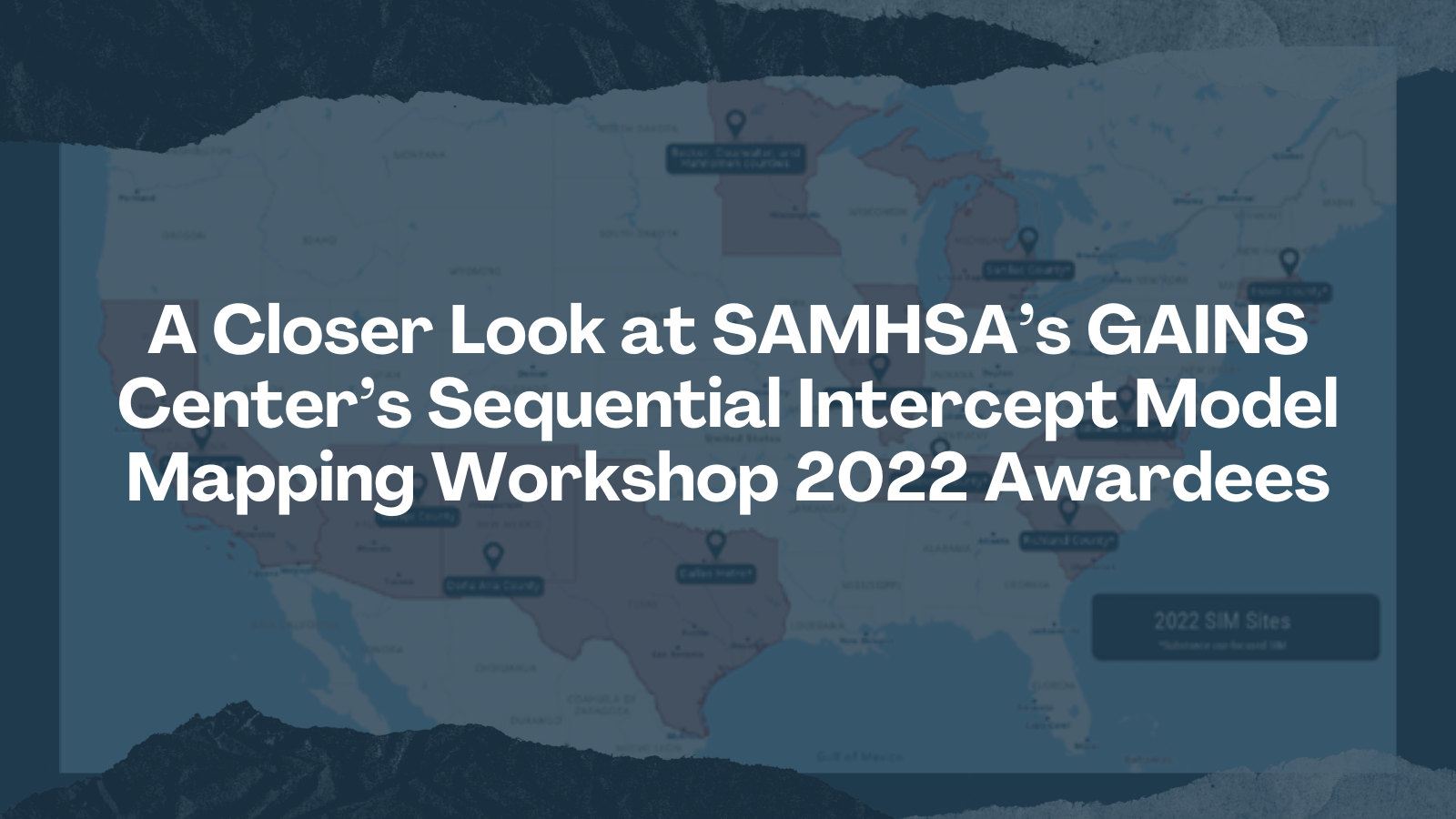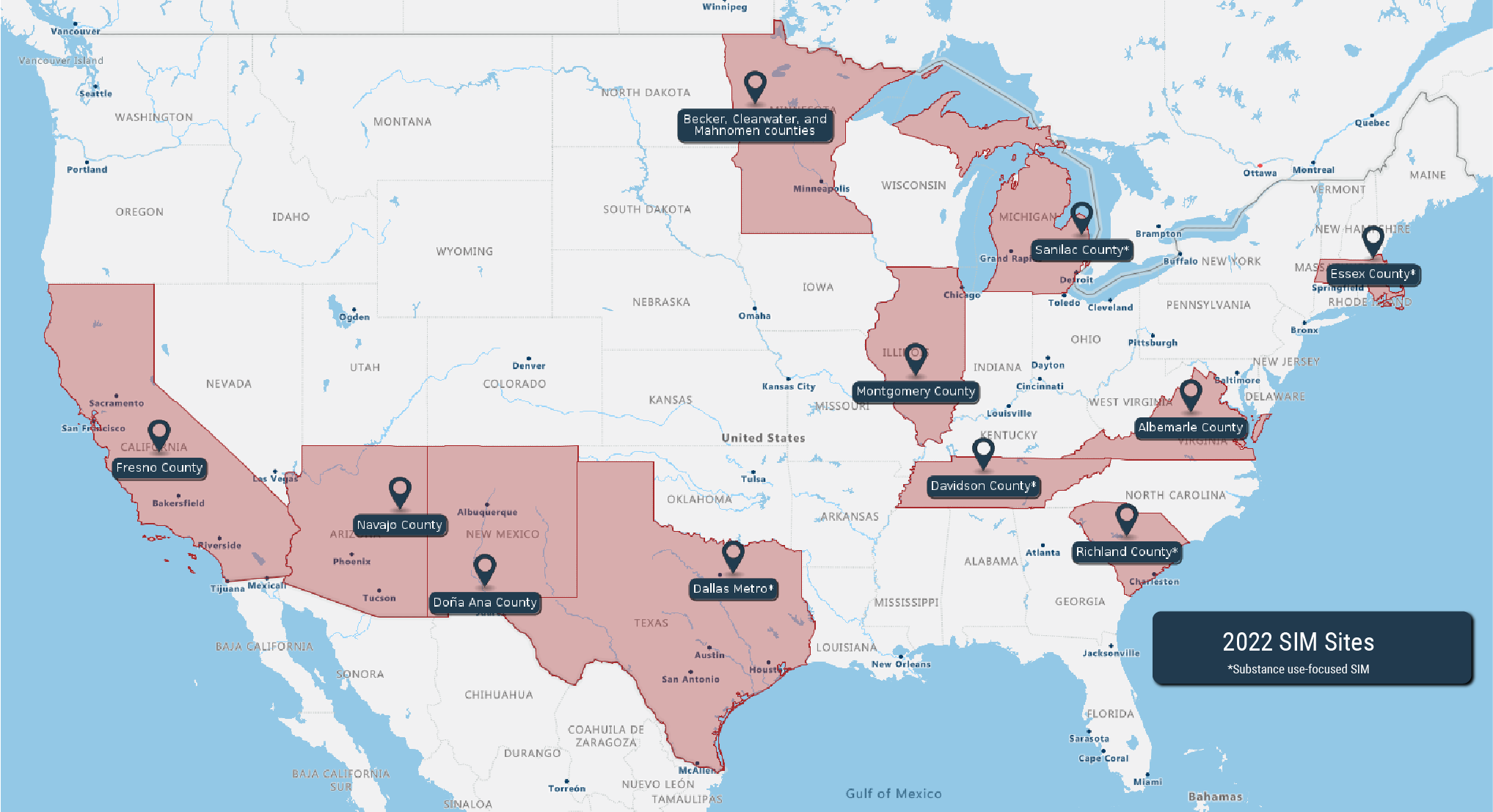SAMHSA’s GAINS Center has provided fully funded Sequential Intercept Model (SIM) Mapping Workshops to select communities and jurisdictions since 2012. SIM Mapping Workshops bring together cross-systems stakeholders to identify strategies to divert people with mental and substance use disorders away from the justice system into treatment.
SAMHSA’s GAINS Center’s 2022 SIM Awardees
This year, the GAINS Center announced the SIM awardees in January 2022. In Fiscal Year 2022, the GAINS Center awarded 11 SIM Mapping Workshops to communities across the country. As of July 2022, half of the awardees have completed their SIM Mapping Workshop. The 11 awarded communities were the following:
- Albemarle County, Virginia
- Becker, Clearwater, and Mahnomen Counties, Minnesota
- Dallas County, Texas
- Davidson County, Tennessee
- Doña Ana County, New Mexico
- Essex County, Massachusetts
- Fresno County, California
- Montgomery County, Illinois
- Navajo County, Arizona
- Richland County, South Carolina
- Sanilac County, Michigan
The Initial Planning Stages of a SIM Mapping Workshop
Once selected as an awardee, the community lead(s) and the GAINS Center begin planning. Planning can take 3 months or more. For each community, essential stakeholders must be identified and invited, dates must be set, and a suitable meeting venue reserved.
For instance, as part of the planning process for the Fresno County (California) Department of Behavioral Health, stakeholder engagement and planning was a crucial part of the Mapping Workshop process. “We reached out to partners in the behavioral health care and criminal justice systems to gauge interest and develop county-wide goals for the SIM [Mapping] Workshop,” says Gavin Harrison, staff analyst – housing, Fresno County Department of Behavioral Health. “We held an internal meeting to review the [SIM], list out resources, and discuss gaps in services. Lastly, we referred to Fresno County’s 2017 SIM Report to reflect on what the goals were then, which ones were met, and where there was room for growth.”
Depending on the size of the jurisdiction receiving the Mapping Workshop, community leads are encouraged to keep their participants between 40 to 60 stakeholders. Sites are recommended to have a balanced list of individuals representing the different intercepts and individuals with lived experience either with the justice system or with mental and substance use disorders.
“I recommend that communities commit to involving those with lived experience and those with programmatic and funding expertise. These will be crucial in order to have a robust discussion that will benefit the target population,” says Harrison. “Showcase your community’s dedication to work together on long-term, systemic solutions driven by data.”
Hosting the SIM Mapping Workshop
The SIM Mapping Workshop brings together community stakeholders across systems and from local agencies to work together to:
- Plot resources and gaps across the 6 intercepts (community services, law enforcement, initial court hearings and initial detention, jails/courts, reentry, and community corrections).
- Identify local behavioral health services to support diversion from the justice system.
- Introduce community system leaders and staff to evidence-based practices and emerging best practices related to each intercept.
- Enhance relationships across systems and agencies.
- Create a customized, local map and action plan to address identified gaps.
After months of planning and preparation, the 1.5-day workshop is a rush of information, collaboration, and planning. “The workshop required us to be forthright about challenges and open-minded about solutions. Because of this, we developed actionable plans with objectives that felt obtainable,” says Harrison. “Throughout this process, our facilitators were very knowledgeable and offered new ways of approaching the challenges we faced.”
The SIM Mapping Workshop process encourages community stakeholders to examine each intercept—or point of contact with the system—to identify service resources and gaps. Once their system is mapped, the stakeholders identify priorities for action planning.
“The SIM Mapping Workshop brought together folks from all departments and facets [of our community] to come to an understanding of what each department was doing to minimize ‘silos’ and duplication of services,” says Maria “Mia” LaFriniere, wellness court coordinator, White Earth Tribal Court, White Earth Nation, Minnesota.
Workshop participants learn how to collaboratively build a plan to fill gaps and work together to establish best practices across intercepts. These include:
- Establish Cross-systems collaboration and coordination of initiatives. Coordinating bodies serve as an accountability mechanism and improve outcomes by fostering community buy-in, developing priorities, and identifying funding streams.
- Conduct routine identification of people with mental and substance use disorders. Individuals with mental and substance use disorders should be identified through routine administration of validated, brief screening assessments and follow-up assessment as warranted.
- Promote access to treatment for mental and substance use disorders. Justice-involved people with mental and substance use disorders should have access to individualized behavioral health services, including integrated treatment for co-occurring disorders and cognitive behavioral therapies that address criminogenic risk factors.
- Link people to benefits, including Medicaid and Social Security, to support treatment success. People in the justice system routinely lack access to health care coverage. Practices such as establishing jail Medicaid suspension (vs. termination) and involving benefits specialists can reduce treatment gaps. People with disabilities may qualify for limited income support from Social Security.
- Share information and measure performance among behavioral health, criminal justice, and housing/homelessness service providers. Information-sharing practices can assist communities with identifying friendly faces, gaining an understanding of the population and its specific needs, and identifying gaps in the system.
As a result of this experience, LaFriniere suggests, “I would recommend to other communities that there is a ‘go-to’ person from each department who has time to work on this project. It is very beneficial to have a person in charge that is a change agent for their community and has coordinator experience,” she says. “I cannot stress enough the importance of an active team when following through with this very important work.”
Apply for a SIM Mapping Workshop this Fall!
In September 2022, SAMHSA’s GAINS Center will begin soliciting applications from communities interested in participating in SIM Mapping Workshops. There are no application fees, and awardees will receive the Mapping Workshop for free. The award covers the costs associated with pre- and post-workshop planning and coordination, travel and lodging, facilitation, data collection and analysis, and report development.
In 2023, SIM Mapping Workshops will be held in person, unless public health or other issues require a switch to a virtual format.
Sign up for the GAINS Center’s mailing list to be notified of the Mapping Workshop solicitation release.




